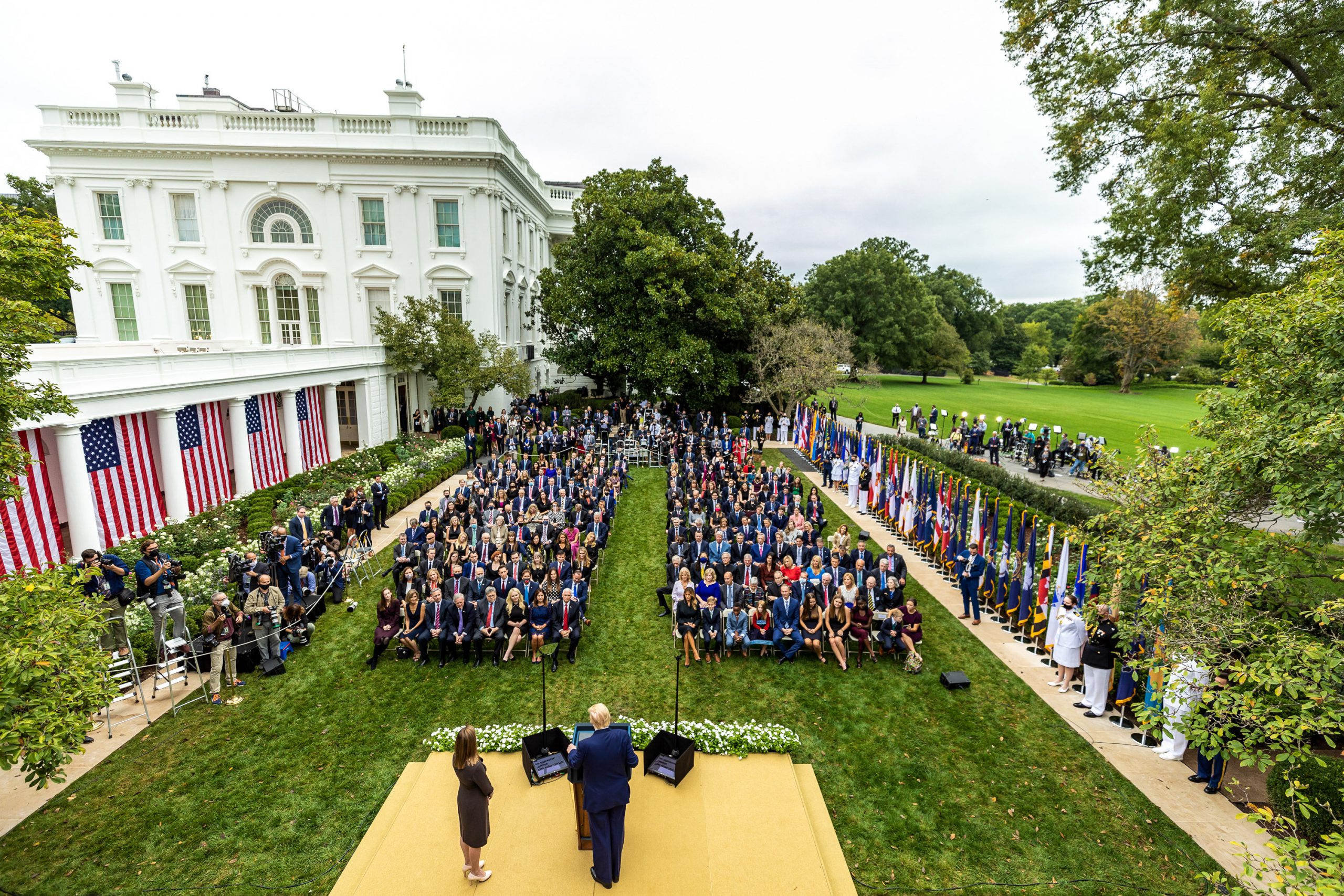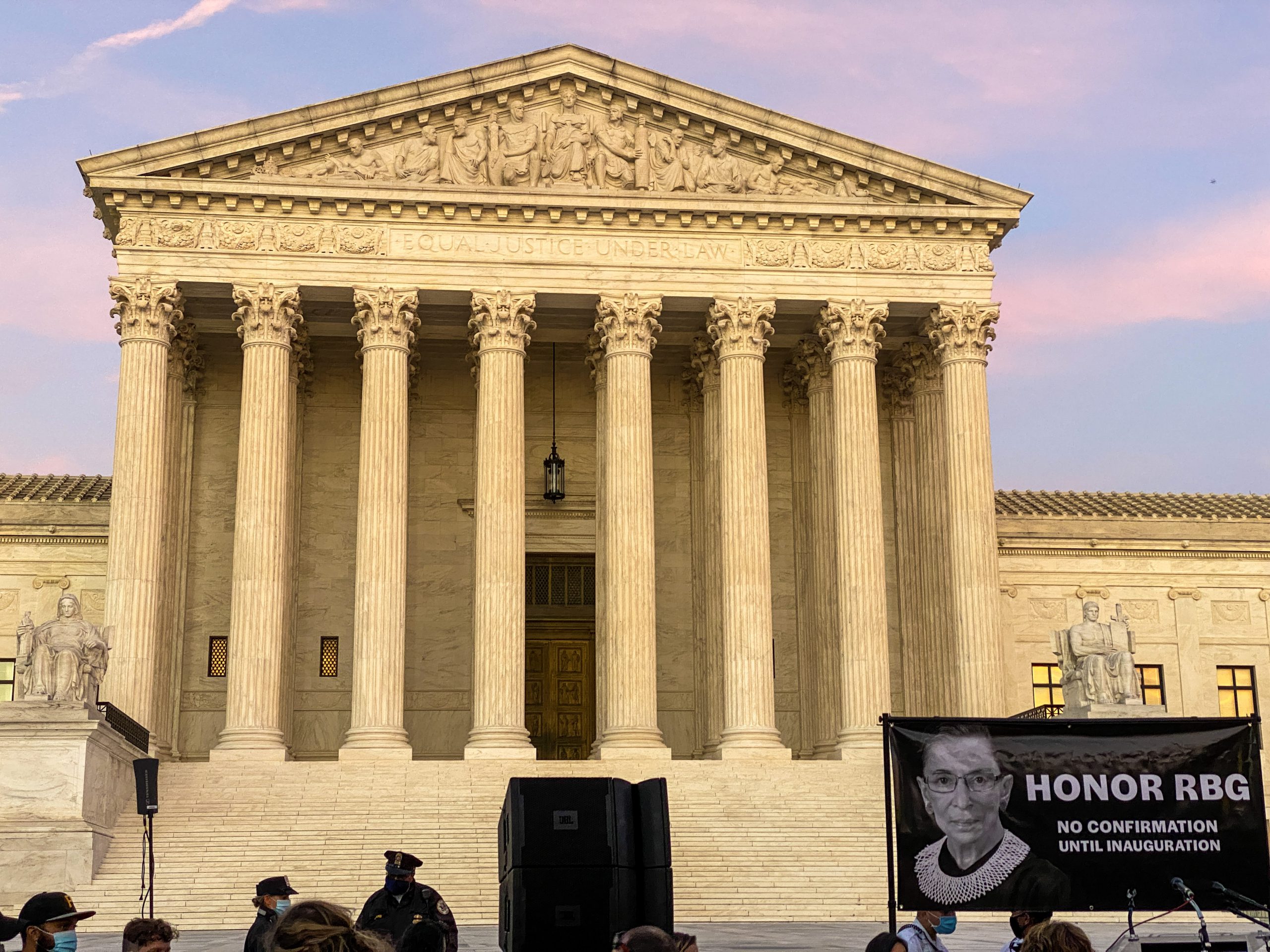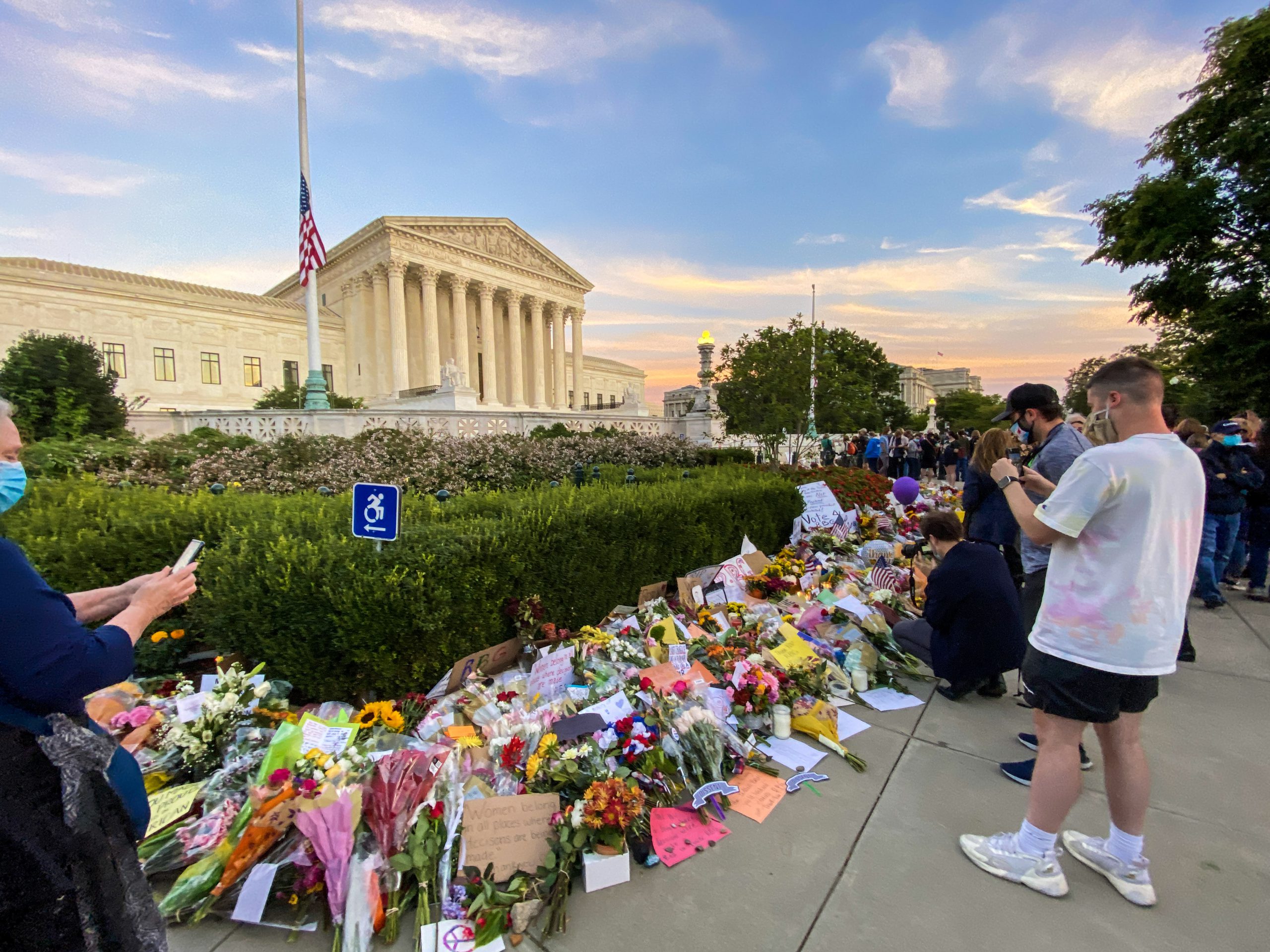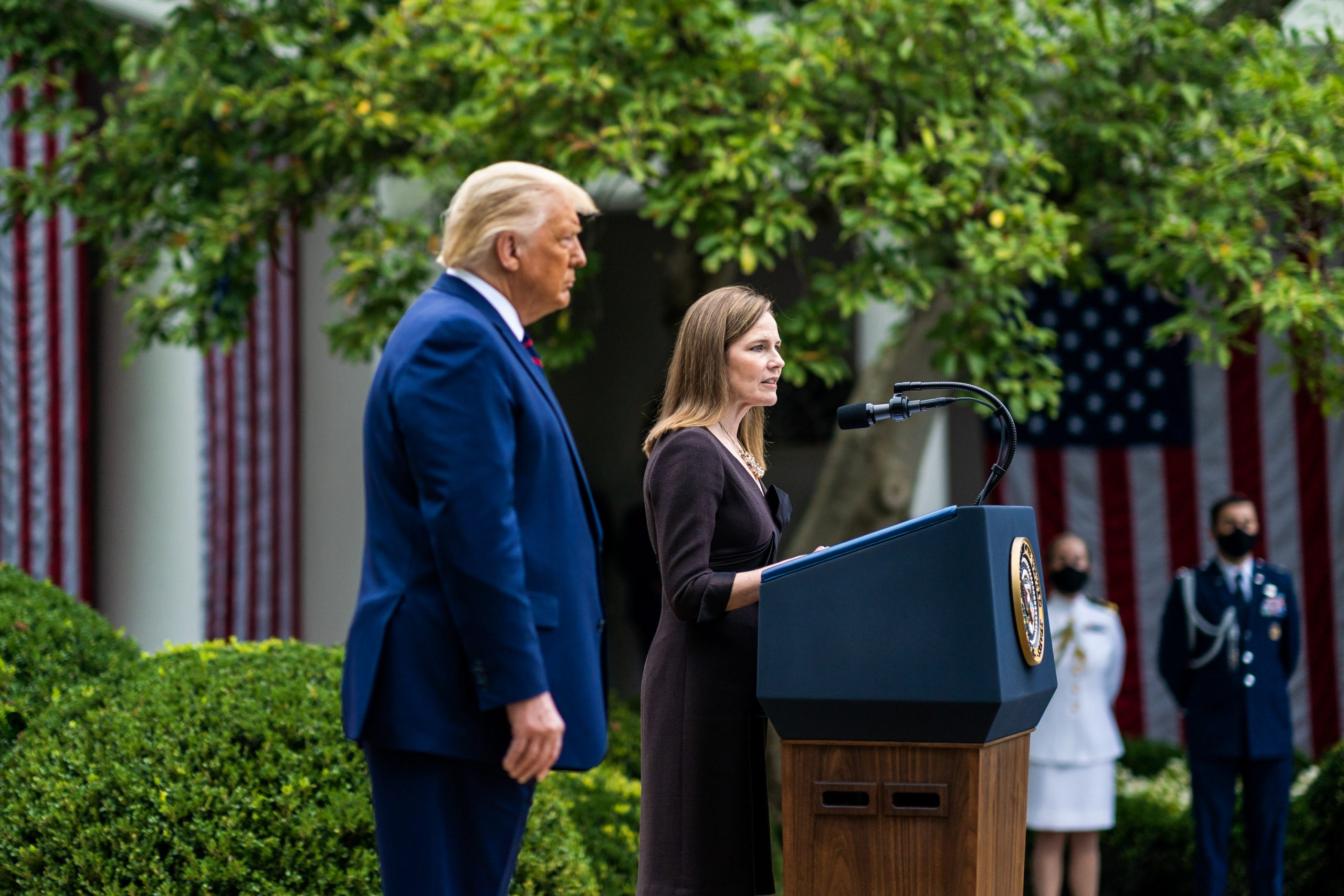Indianz.Com > News > Supreme Court opens new session amid COVID-19 and controversy

Supreme Court opens new session amid COVID-19 and controversy
Tuesday, October 6, 2020
Indianz.Com
Amid growing uncertainty due to the COVID-19 pandemic, the U.S. Supreme Court opened its new term on Monday, as Republicans remain intent on confirming a conservative judge with virtually no experience in Indian law to the nation’s highest judicial body.
Even though two GOP members of the Senate Committee on the Judiciary have tested positive for COVID-19, the disease caused by the coronavirus, the panel’s Republican leader still plans to hold a confirmation hearing for Judge Amy Coney Barrett next Monday as planned. The rush to move forward drew a sharp condemnation from Sen. Tom Udall (D-New Mexico), the vice chairman of the Senate Committee on Indian Affairs, who said tribal concerns aren’t being taken into account.
“Instead of pushing a partisan nomination process through the Senate during a critical moment in our country’s history, Senate Republicans should respect the federal government’s duty—and trust obligation—to engage in meaningful tribal consultation on the impact this vital nominee will have on Indian Country’s future,” said Udall, who is retiring at the end of the current legislative session. “They must stop putting partisan politics ahead of our core democratic principles and let the American people decide who nominates the next Supreme Court justice.”
But with Democrats outnumbered in the U.S. Senate, there appears to be little they can do to stop Barrett from advancing. The two Judiciary members who tested positive — Sen. Mike Lee (R-Utah) and Sen. Thom Tillis (R-North Carolina) — are cutting their coronavirus quarantines short in order to be in Washington for an anticipated committee vote on the nomination.
Without Lee and Tillis present, Republicans might not be able to move forward with Barrett. The GOP holds 12 seats on the committee, compared to 10 for the Democrats, so every vote counts.
And should the committee approve Barrett following the confirmation hearing, Democrats likely won’t be able to stop a final vote on the Senate floor, as it only takes a simple majority to confirm a judicial nominee. Republicans hold 53 seats in the chamber, enabling them to easily confirm hundreds of judges to courts that make decisions affecting tribal nations and their citizens. “As vice chairman of the Senate Committee on Indian Affairs, and as the senator representing 23 Pueblos and Tribes of New Mexico in Congress, I believe that Judge Amy Coney Barrett’s confirmation would have dangerous implications for Indian Country,” said Udall. Udall was referring specifically to a Republican-led case against the Affordable Care Act (ACA). Repealing the ACA would undo the Indian Health Care Improvement Act, which tribes fought hard to reauthorize in 2010, overcoming years of opposition from GOP members of Congress, as well as from the Republican George W. Bush administration. Undoing the ACA would also eliminate other provisions that have benefited the first Americans and the care they receive from the Indian Health Service. The Supreme Court is set to hear the case on November 10 and Republicans hope Barrett will be on board by then, to help decide a challenge brought by the Republican attorney general of Texas. “Confirming a nominee that will dismantle the ACA is unconscionable, and will exact a cruel toll on Native communities who are already fighting the disproportionate impacts of the COVID-19 pandemic,” Udall said on Monday.Republicans should end their attempt to force through a #SCOTUS nominee with dangerous implications for all Native communities. The GOP quest to destroy the Affordable Care Act would throw the IHS into chaos & jeopardize Native communities’ work to fight COVID-19. #WhatsAtStake https://t.co/Tp7dOsviWN
— Tom Udall (@SenatorTomUdall) October 5, 2020

In Re Scott Louis Youngbear
Scott Louis YoungBear, a citizen of the Meskwaki Nation, sought review of an Iowa Supreme Court decision in which he challenged his continued placement on the state’s sex offender registry. He raised issues of religious freedom, constitutional rights and tribal sovereignty in a petition he submitted himself to the U.S. Supreme Court.
The state of Iowa waived its right to respond to In Re Scott Louis Youngbear. In an order list on Monday, the justices declined the petition without comment.
Native Wholesale Supply Company v. California, ex rel. Xavier Becerra
Native Wholesale Supply Company, a business that was started by a citizen of the Seneca Nation, sued the state of California in connection with the sale of tobacco to the Big Sandy Rancheria Band of Mono Indians.
In a July 2019 decision, an appeals court in California held Native Wholesale liable for violating state laws. The ruling stands following the Supreme Court’s rejection of the petition in
Native Wholesale Supply Company v. California, ex rel. Xavier Becerra on Monday.

Nobles v. North Carolina
George Lee Nobles it not a citizen of the Eastern Band of Cherokee Indians but his mother is enrolled in the tribe. As such, he is considered a “first descendant” and is entitled to receive certain services from the tribal government. He also lived on and near the reservation in North Carolina for his entire life. He was even employed by the tribe for a time.
But Nobles is not an “Indian,” according to a March 2020 decision from the North Carolina Supreme Court. The ruling cited his lack of participation in certain aspects of tribal life and noted that he “did not hold himself out as an Indian.”
As a result, the state court asserted authority over Nobles for a murder and robbery committed on the reservation. Two co-defendants, on the other hand, were subject to tribal jurisdiction because one was an Eastern Cherokee citizen while the other was a Cherokee Nation citizen. Under federal law, an “Indian” defendant could also be subject to the Major Crimes Act for crimes committed in Indian Country.
In his petition, Nobles noted that the North Carolina court system “faulted him for having tattoos — an eagle and an Indian headdress — that are too generically Indian and not closely enough connected to the Eastern Band of Cherokee Indians in particular.”
“When a person is part Indian and part non-Indian, a test that allows courts to weigh every aspect of his life will allow courts to reach either result in almost any case,” the petition said in highlighting the seemingly arbitrary nature of how the North Carolina courts determine who is “Indian” and who is not.
The state of North Carolina waived its right to respond to Nobles v. North Carolina. In an order list on Monday, justices declined the petition without comment.
Still on the watch
The Tribal Supreme Court Project, a joint initiative of the National Congress of American Indians and the Native American Rights Fund, is monitoring four pending petitions. One of them is garnering wide interest.
At issue in United States v. Cooley is whether a tribal police officer had the authority to stop and detain a non-Indian on a public road on the Crow Reservation in Montana. During the stop, evidence of methamphetamine trafficking was uncovered, leading to federal charges against James Cooley.
In a March 2019 decision that took almost a year to render, the 9th Circuit Court of Appeals ruled that the the tribal officer was wrong for failing to ascertain the defendant’s “Indian” status despite searching his vehicle twice during the stop. The ruling — if it stands — allows the evidence gathered against Cooley to be suppressed, thus derailing the charges against him in a state where meth has been a scourge in Indian Country.
The decision has drawn dire warnings from a broad range of interests. The Crow Tribe, the National Indigenous Women’s Resource Center (NIWRC) and even the Trump administration are calling on the Supreme Court to reverse the 9th Circuit.
In a friend of the court brief joined by five tribes, the NIWRC wrote that
“Native women suffer the highest rates of violence in the United States, the majority of the perpetrators of these crimes are non-Indian, and many reservations contain large populations of non-Indian residents and large swaths of non-Indian fee land.”
“For Tribal Nations who seek to protect Native women in their own homes, the Ninth Circuit’s decision is alarming,” the NIWRC wrote.
It’s hard to ignore the weight of the federal government yet Cooley waived his right to respond to the petition in United States v. Cooley. The Supreme Court has since ordered him to provide a response by October 15, after which the petition will be considered again.
• US v. Cooley:
Department of Justice Petition | Crow Tribe Brief | NIWRC Brief |
Docket No. 19-1414

Amy Coney Barrett
The Senate Committee on the Judiciary is scheduled to begin the confirmation hearing for Amy Coney Barrett on October 12. Sen. Lindsey Graham (R-North Carolina), who is seeking re-election this year, has said it will last three to four days.
Barrett currently serves on the 7th Circuit Court of Appeals though she hasn’t decided any cases affecting tribes. Writing on the influential Turtle Talk blog, professor Matthew Fletcher described her Indian law record as “thin.”
Should Barrett win confirmation as an associate justice, she would be the 6th member of the Supreme Court who was nominated by a Republican president. The other three were chosen by Democratic presidents.
Barrett, a former professor at University of Notre Dame Law School in Indiana, located on the homelands of the Pokagon Band of Potawatomi Indians, was introduced to the public on September 26. The event, held at the White House, was attended by Sen. Lee, Sen. Tillis and several others who have since tested positive for COVID-19.
President Donald Trump also tested positive following the event, and spent three days in the hospital before being discharged on Monday evening. First Lady Melania Trump tested positive as well, as did the president of the University of Notre Dame.
According to The Washington Post, Barrett recovered from a COVID-19 diagnosis over the summer. The 7th Circuit has declined to answer questions about her health situation, The Indiana Lawyer reported.
Related Stories
Sen. Tom Udall: A ‘clear and present threat’ to health care in Indian Country (October 5, 2020)Native America Calling: Filling Justice Ruth Bader Ginsburg’s seat (October 2, 2020)
Trump administration deals with fallout from tribal victory at Supreme Court (September 30, 2020)
Republicans rush to confirm Supreme Court nominee ahead of election (September 28, 2020)
Montana American Indian Caucus: Don’t vote on U.S. Supreme Court nominee (September 28, 2020)
Montana Free Press: Affordable Care Act deemed essential for Indian Country (September 28, 2020)
Search
Filed Under
Tags
More Headlines
President Trump vetoes tribal homelands bill with swipe at trust relationship
Native America Calling: The Pleiades star cluster ushers in winter story season
NAFOA: 5 Things You Need to Know This Week (January 5, 2026)
Native America Calling: Native in the Spotlight with Elaine Miles
Native America Calling: Gearing yourself up for 2026
Statement: Chairman of Miccosukee Tribe on veto of homelands bill
Native America Calling: Lumbee Nation secures its sovereign status
Chuck Hoskin: Cherokee Nation builds on tradition with technology
Native America Calling: The Year in Native News
Native America Calling: Native music in 2025
Native America Calling: Amid Greenland’s independence push, Denmark accounts for colonial blunders
Senate Committee on Indian Affairs sets business meeting and hearing
Native America Calling: Saving historic architecture and other important places
VIDEO: H.R.2400, the Pit River Land Transfer Act of 2025
VIDEO: H.R.3620, the Southcentral Foundation Land Transfer Act of 2025
More Headlines
Native America Calling: The Pleiades star cluster ushers in winter story season
NAFOA: 5 Things You Need to Know This Week (January 5, 2026)
Native America Calling: Native in the Spotlight with Elaine Miles
Native America Calling: Gearing yourself up for 2026
Statement: Chairman of Miccosukee Tribe on veto of homelands bill
Native America Calling: Lumbee Nation secures its sovereign status
Chuck Hoskin: Cherokee Nation builds on tradition with technology
Native America Calling: The Year in Native News
Native America Calling: Native music in 2025
Native America Calling: Amid Greenland’s independence push, Denmark accounts for colonial blunders
Senate Committee on Indian Affairs sets business meeting and hearing
Native America Calling: Saving historic architecture and other important places
VIDEO: H.R.2400, the Pit River Land Transfer Act of 2025
VIDEO: H.R.3620, the Southcentral Foundation Land Transfer Act of 2025
More Headlines